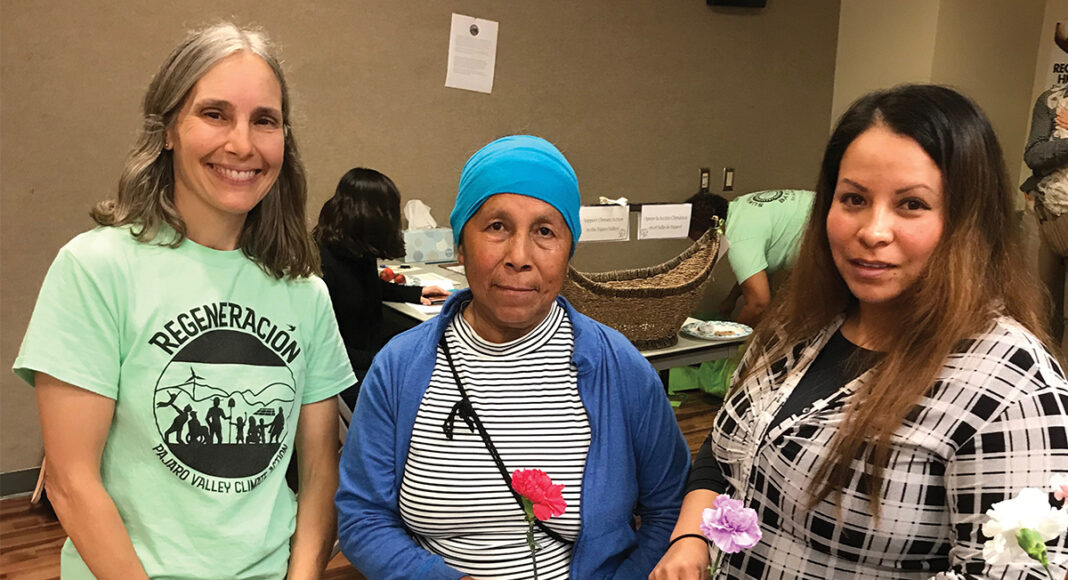While curious environmentalists nibble on local strawberries, MariaElena De La Garza, the executive director of Santa Cruz County Community Action Board, is posing some tough questions about the future of the planet, climate change and its potential effects on this area.
“What would happen to this valley if the world warms 2 degrees hotter, 4 degrees hotter, 7 degrees hotter?” asks De La Garza, as she emcees a Watsonville event unveiling a survey that examined anxieties about the county’s environmental future. “What would happen to those strawberries? And more importantly, what would happen to the community that works in those strawberries?”
In a packed house at the Watsonville City Hall Community Room on Thursday, May 3, attendees gathered to hear the findings of the community-based research project, the first to engage Watsonville residents on their experiences with and concerns about climate change. For 73 percent of those surveyed, this was their first time participating in a survey. Eighty-four percent of participants were Latino.
Xitlali Cabadas is a member of Revolunas, the volunteer group that took the lead in talking to 186 residents in public places like parks and shopping centers throughout Watsonville, with 138 more completing the survey online.
Cabadas says it should come as no surprise that farmworkers in the fields picking the food we eat are deeply affected by all types of extreme weather. Survey findings show that 74 percent of agriculture workers are impacted by extreme heat conditions in the workplace, whereas only 40 percent of non-agricultural workers say they feel those impacts directly. Several respondents reported an increase in people fainting in the fields and having to reduce work hours, or work only during the earliest hours of the day due to the rising temperatures.
Cabadas found that people were eager to offer input about a problem that for them has already become very real. “As a community member, you want what’s best for the environment because you live here, and it is affecting our water,” she says. ‘It’s affecting our air. It’s affecting our schools.”
The event, hosted by Regeneración – Pajaro Valley Climate Action, was a revealing look at the environmental justice challenges Santa Cruz County is already facing, particularly in disadvantaged communities.
Francisco Rodriguez, who has served as president of the Pajaro Valley Federation of Teachers since 2008, has been teaching in Watsonville for more than 20 years. As the son of migrant farmworkers who traveled throughout agricultural areas in the Rio Grande Valley of Texas and California’s Central Valley, he is concerned with the use of hazardous pesticides and fumigants near schools.
“We know there’s climate change, but we also want to understand the impact on people,” Rodriguez says. “And not just the impact, but understand the disproportionality of the impact and who is being affected and to what degree.” He adds that he was encouraged to see so many respondents show an interest in making their community a better place.
Dr. Shishir Mathur, associate dean of Research at San Jose State University’s College of Social Sciences, oversaw the study, training the volunteers and conducting the analysis.
The number one initiative the community favored to reduce pollution and greenhouse gas emissions was increasing access to local organic agriculture. Concerns with pollution including litter, pesticides and car exhaust topped the list as negatively affecting the community.
The potential ramifications of climate change pose threats that local governments are grappling with as well. The city and county of Santa Cruz both filed complaints against 29 fossil fuel companies this past December to recover damages incurred from climate change. Sher Edling, a law firm based in San Francisco, is representing both the city and county, along with at least five other California communities. The firm is covering the bulk of the fees, with some support from local counsel.
In its findings, the Climate of Hope survey shows a preference among Watsonville residents for better forms of public transportation, including the rail connection between Davenport and Watsonville, as well as better sidewalks for walking, bike lanes and clean energy.
Looking at the finished work, Cabadas sees the survey as a conversation starter.
“Seeing actual data about what Watsonville thinks is going to help us steer the way we need to go,” she says, “what policies need to change, what we need to bring in.”














